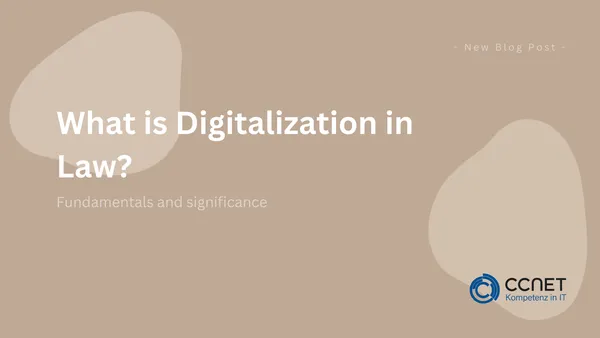
CCNet
Jun 19, 2024 • 3 min read

What is Digitalization in Law?
The digitalized legal system is undergoing profound transformation. Digitalization in law is an exciting process that is not only revolutionizing how legal services are offered and used but also has the potential to significantly improve accessibility and efficiency in the justice system. In this article, we take a detailed look at what digitalization in law means, which technologies play a role in it, and how they are changing legal practice.
Further information can be found here: consultation
Definition of Digitalization in Law
Digitalization in law, often referred to as "Legal Tech," encompasses the use of digital technologies and software to support, improve, or automate legal processes. This ranges from simple solutions like digitizing documents to more complex systems like artificial intelligence (AI), which can support or even predict legal decisions.
Key Technologies in Legal Digitalization
- Electronic Document Management: Systems for storing, searching, and managing documents in digital form, reducing paperwork and boosting efficiency.
- Blockchain Technology: Used to securely and transparently document transactions, which is especially important in contract law.
- AI and Machine Learning: Used to predict court decisions, perform legal analyses, and even automate routine tasks.
- Online Platforms for Legal Services: Allow users to access legal assistance without physically visiting a law firm.
Benefits of Digitalization in Law
Efficiency Gains
By automating recurring and standardized tasks, lawyers and courts can work faster and more cost-effectively. This leads to faster case processing and more efficient adjudication, freeing up time for more complex cases.
Increased Transparency
Digital technologies enable better documentation and tracking of legal processes. This contributes to increased transparency in the justice system and strengthens public trust, ensuring fairness in proceedings.
Improved Access to Justice
Digital platforms and online services make legal support accessible to broader segments of the population, especially for those who cannot afford traditional legal services or live in remote areas, bridging the justice gap.
Challenges and Solutions
Data Protection and Security
Legal data is often particularly sensitive. Protecting this data from unauthorized access and misuse is crucial. Advanced encryption techniques and secure data storage are necessary to ensure confidentiality, maintaining client trust.
Resistance to Change
The legal industry often has a natural skepticism toward new technologies. Training and education programs can help build trust in new technologies and promote their acceptance, facilitating smoother transitions.
Legal and Ethical Concerns
Automating legal decisions raises questions of accountability and moral acceptability. Clear guidelines and laws are needed to regulate the use of AI and other technologies in the legal sector, ensuring ethical practices.
Conclusion
Digitalization in law is an ongoing process that has the potential to comprehensively modernize the legal system. It offers tremendous opportunities for efficiency and transparency but also poses significant challenges that require careful consideration. Through continued dialogue among technology experts, legal professionals, and society, we can ensure that the benefits of digitalization are accessible to everyone. By addressing these challenges collaboratively, we can leverage technology to enhance the fairness and accessibility of the legal system without undermining the ethical foundations of our legal system, ensuring that digital advancements contribute positively to justice for all.
What does digitalisation mean in law?
Digitalisation in law encompasses the use of digital technologies and software to support, improve or automate legal processes. This ranges from the digitalisation of documents to complex AI applications that support or predict legal decisions.
Which technologies play a key role in legal digitisation?
Important technologies in legal digitisation include electronic document management, blockchain for secure transactions, AI and machine learning for predicting court decisions, and online platforms for accessing legal services.
What data protection and security issues arise in legal digitisation?
As legal data is often particularly sensitive, digitisation requires advanced encryption techniques and secure data storage to ensure protection against unauthorised access and misuse.
How is data protection ensured in digital law?
Sensitive legal data can be protected through the use of secure data storage solutions and advanced encryption techniques. Data protection remains a key aspect of ensuring confidentiality and security.
How does digitisation improve access to the legal system?
Digital platforms and online services enable a broader population to obtain legal support, especially for people who cannot afford traditional legal services or live in remote areas.
What are the advantages of digitalisation in the legal system?
Digitalisation increases efficiency, enhances transparency and improves access to justice by enabling faster and more cost-effective case processing and reaching a wider audience.
What are the challenges of digitalisation in law?
Challenges include data protection and security issues, resistance to change in the legal industry, and legal and ethical concerns, particularly with regard to the automation of legal decisions.
How can the challenges of digitalisation in law be overcome?
Training professionals, developing clear guidelines for the use of technologies such as AI, and promoting dialogue between technology experts, lawyers and society are crucial to harnessing the benefits of digitalisation responsibly.


